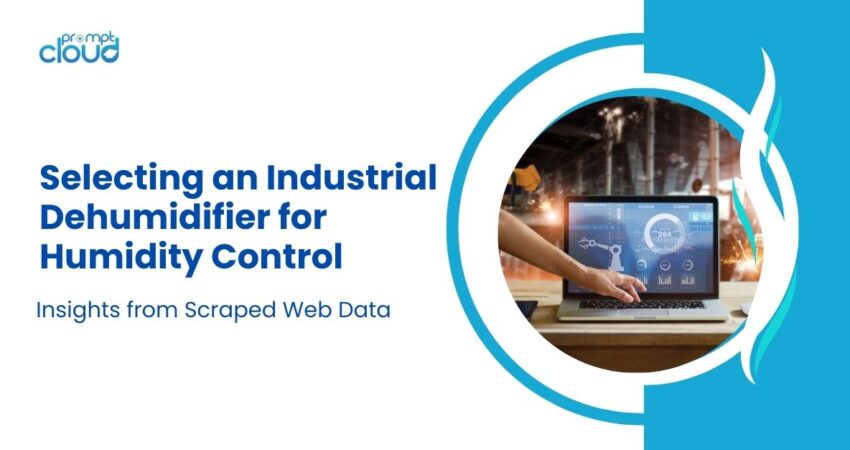
Controlling humidity is a critical factor in maintaining optimal conditions in industrial settings. Excess moisture can damage equipment, compromise materials, and even impact employee safety and comfort. Industrial dehumidifiers play a pivotal role in mitigating these risks by efficiently reducing moisture levels and ensuring a controlled environment.
Selecting the right industrial dehumidifier can be challenging, given the range of options available on the market. This guide provides an in-depth look at what to consider when choosing the best solution for your humidity control needs.
Assessing Your Specific Needs
Before selecting an industrial dehumidifier, it’s essential to understand the unique requirements of your facility. Different industries have varying humidity control needs, depending on factors such as the type of materials stored, the size of the space, and environmental conditions.
For example, facilities that handle perishable goods, such as food or pharmaceuticals, require precise humidity control to maintain product quality. Similarly, manufacturing plants may need dehumidifiers to protect machinery from rust and corrosion. Identifying your specific needs ensures you select a system that effectively addresses your challenges. If you’re exploring options for industrial drying equipment, consider the type of environment in which it will operate. Factors such as temperature fluctuations, ventilation, and the presence of contaminants can influence the performance of a dehumidifier.
Capacity and Performance
The capacity of an industrial dehumidifier refers to the amount of moisture it can remove from the air over a specific period, usually measured in pints or liters per day. Selecting a dehumidifier with the appropriate capacity is critical for maintaining efficiency and ensuring adequate moisture control.
To determine the capacity you need, consider the size of the area and the level of humidity to be managed. A small storage room with moderate humidity levels may require a compact unit, while a large manufacturing plant with high moisture levels will need a more robust system.
Performance is also influenced by factors such as airflow and energy efficiency. High-performance dehumidifiers can handle demanding conditions without consuming excessive energy, making them a cost-effective choice for long-term use.
Durability and Build Quality
Industrial environments are often harsh, with exposure to dust, chemicals, and fluctuating temperatures. As such, the durability of a dehumidifier is a crucial consideration. Look for units constructed from high-quality materials that can withstand the rigors of industrial use.
Features like corrosion-resistant components, rugged casings, and robust internal parts contribute to the longevity of the equipment. Investing in a durable dehumidifier reduces the risk of breakdowns and minimizes maintenance costs over time.
Dehumidifiers designed for industrial use often include features like washable filters, which are essential for maintaining performance in challenging environments.
Control Features and Automation
Modern industrial dehumidifiers come equipped with advanced control features that simplify operation and improve efficiency. Look for models with user-friendly interfaces that allow you to monitor and adjust settings easily.
Automation capabilities, such as programmable humidity levels, timers, and remote control options, can significantly enhance the functionality of a dehumidifier. These features enable you to maintain consistent humidity levels without constant manual intervention.
Some advanced systems even include smart technology, allowing you to monitor and control the unit remotely through a smartphone or computer. This level of convenience is particularly valuable in large facilities where constant monitoring may not be feasible.
Noise Levels and Placement
Noise levels are an important consideration, especially if the dehumidifier will be operating in areas where noise may disrupt productivity or comfort. While industrial dehumidifiers are generally louder than residential models, many manufacturers offer noise-reduction features to minimize their impact.
Placement also plays a role in noise control. Units designed for ceiling or wall mounting can help keep noise away from high-traffic areas, while portable models can be strategically positioned for optimal performance.
Ensure the dehumidifier you choose is suitable for the intended placement and has the necessary mounting or mobility options for your facility’s layout.
Maintenance and Serviceability
Regular maintenance is essential for keeping an industrial dehumidifier running efficiently. Before purchasing, evaluate the ease of servicing the unit. Features like accessible filters, detachable tanks, and clear maintenance instructions simplify routine upkeep.
Consider the availability of replacement parts and the manufacturer’s service network. Dehumidifiers from reputable brands typically come with better customer support and warranty options, ensuring you can resolve issues quickly if they arise.
Choosing a system with straightforward maintenance requirements saves time and effort, reducing the overall cost of ownership.
Energy Efficiency and Environmental Impact
Energy efficiency is a critical factor when selecting an industrial dehumidifier, as these systems often run continuously in demanding environments. Look for models with energy-efficient ratings to minimize operational costs without compromising performance.
Some dehumidifiers are designed with environmentally friendly features, such as eco-friendly refrigerants or energy-saving modes. Choosing a sustainable option not only benefits the environment but also aligns with corporate responsibility goals.
Calculating the long-term energy costs of a dehumidifier can help you make a more informed decision, ensuring the system provides value over its lifespan.
Customization and Scalability
Every industrial facility has unique requirements, and a one-size-fits-all solution may not always suffice. Many manufacturers offer customizable dehumidifiers tailored to specific needs, whether it’s handling extreme conditions or integrating with existing HVAC systems.
Scalability is another important consideration. If your facility’s needs are likely to grow or change, investing in a system that can be easily expanded or upgraded ensures your dehumidifier remains effective in the long term.
Working with a manufacturer or supplier who understands your industry can help you find a solution that fits your current and future needs.
Selecting the right industrial dehumidifier is essential for maintaining optimal humidity levels and protecting your facility from moisture-related issues. From understanding your specific needs to evaluating performance, durability, and energy efficiency, each factor plays a crucial role in ensuring the system meets your requirements.
Whether you’re managing a warehouse, manufacturing plant, or specialized storage area, investing in equipment designed for your environment ensures consistent performance and long-term reliability. By taking the time to assess your options and choose wisely, you can create a controlled environment that supports productivity, safety, and operational efficiency. We hope that this article was helpful.

















































